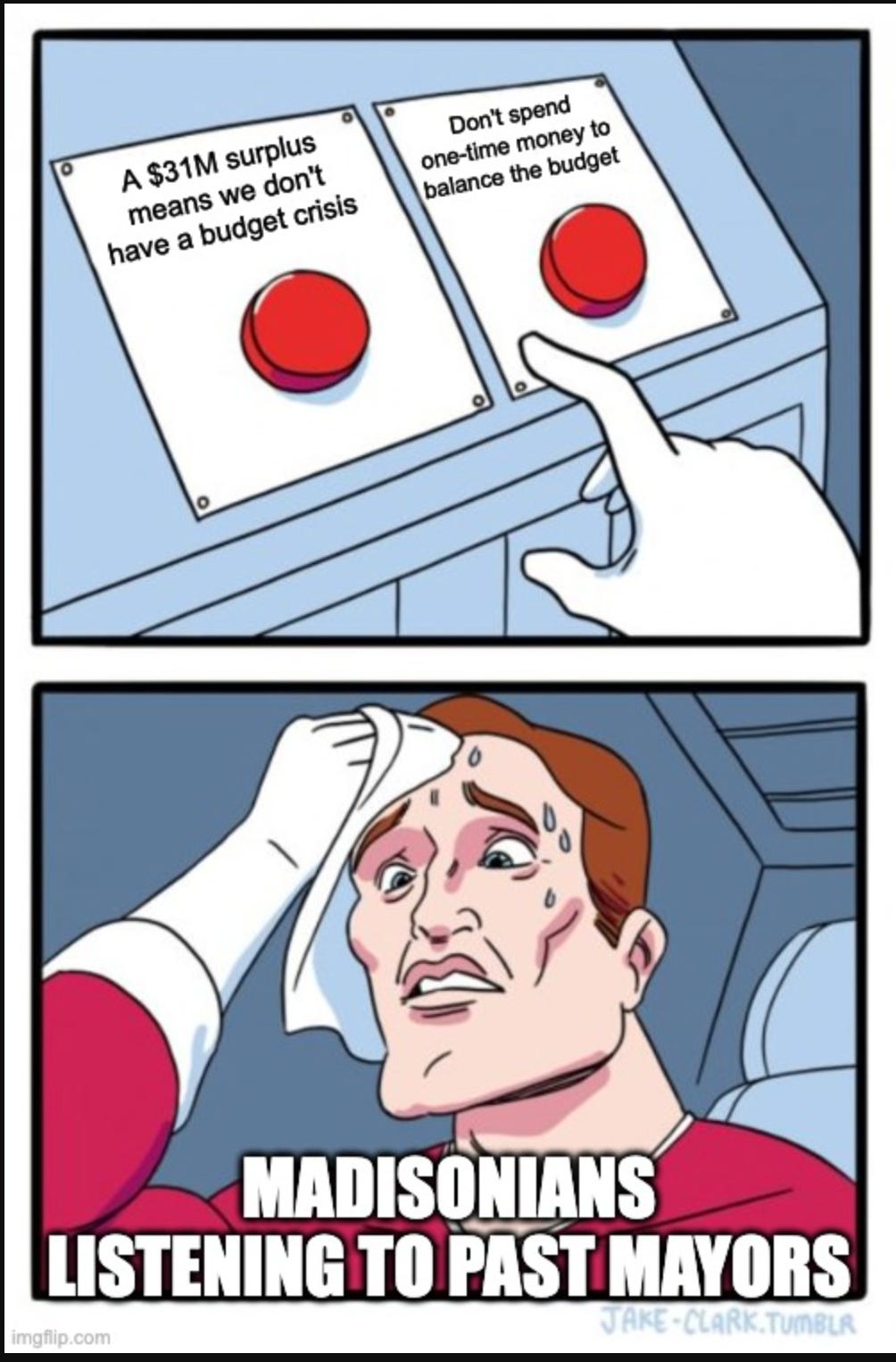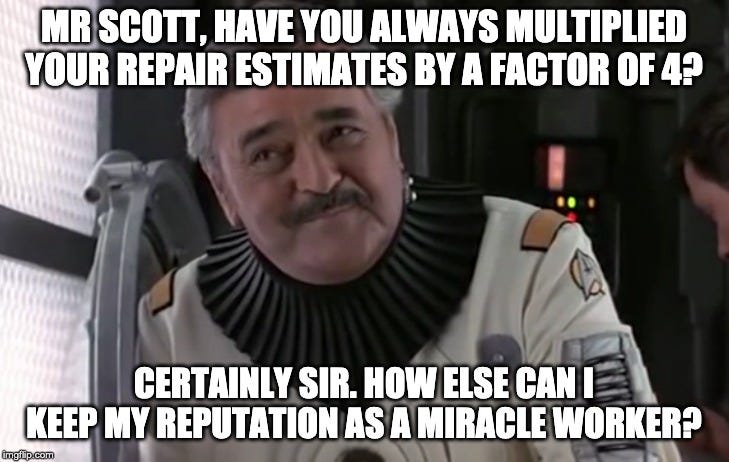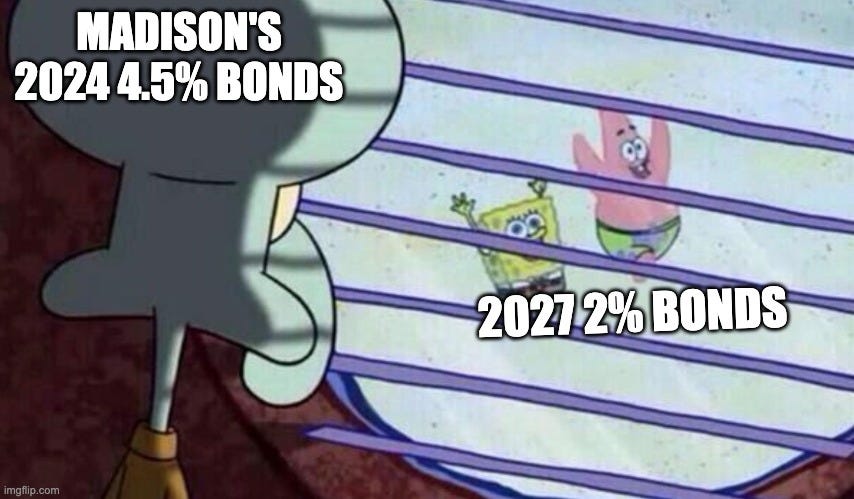Madison’s Budget Challenge Part 3: How the 2023 $31M budget surplus is actually bad news
The third of a four part series and a bit shorter than the first two, in this post I’ll explain why Madison’s $31M surplus from 2023 was bad news for the City and future budgets.
Miracle Workers
City Finance staff are a bit conservative. I mean that in the best possible way, and I certainly don’t mean it in the political sense. (I actually have no idea what their politics are.) By conservative I mean “the numbers we give you are accurate and if there is uncertainty we undershoot”, which I think is exactly what one would want in a Finance staff. You can trust them for numbers that won’t get you in trouble.
It’s so well known that as a city we just sort of roll with it. Here’s former Mayor Dave, writing back in November of 2023:
Every Madison city budget follows the same script. In the spring the city finance director gives the mayor budget projections for the next year that always show a deficit. The mayor always issues dire warnings about this being the toughest budget ever. I did that eight years in a row and I believed it every time I said it.
And then things work out. They just do.
And, sure enough, several week ago we woke up to these headlines:
Madison's finances came out a whopping $31.2M better than expected in 2023
So the streak continues from the finance department.
Crisis averted? Maybe not.
Sticking with Mayor Dave, a few days later he wrote on his Isthmus blog a piece titled “City of Madison budget crisis averted?” and kicked it off with “You know that city of Madison budget crisis you’ve been hearing so much about? Yeah, well, maybe not so much. Last week we got a report that suggests things might be less dire than had been thought.”
I think we need to be clear. The Madison budget is still in crisis. The funding mechanisms are not sustainable.
Two “in fairness” disclaimers:
First, I think that Dave does recognize that structurally things are unsound and if you were to press him, he’d tell you he’s only focused on the possibility of a referendum in 2024.
Second, while I am going to tell you that this surplus is masking underlying bad news, I will say that if the alternative to a $31.2M overperformance as a $31M underperformance, I’m much happier to have the overperformance.
But let’s talk about why this is bad news. Here’s the Finance Staff’s presentation to the Finance Committee if you want to read the details yourself: https://madison.legistar.com/View.ashx?M=F&ID=12897471&GUID=439C49A2-769C-48A3-923A-68788462F059
Problem #1: Much of the surplus came from high interest rates. We don’t want high interest rates.
Something that I bet most Madisonians don’t know is that the City has a lot of money. We talk a lot about the “rainy day fund”, but we also have other money. We have short-term money - money that comes in because many people pay their entire property tax before we need it. The City holds reserve funds that enterprises are building up for future use. We save away some parking money and golf course money each month to use in the future for repairs. Explaining all of the city’s fund balances and investment positions is both beyond the scope of this blog post and my ability to concisely explain it, but suffice it to say that we have a lot of money. The 2023 Financial Statements should be posted soon and you can read about it all here: https://www.cityofmadison.com/finance/accounting/financial-statements
(One thing the City does not have is retirement savings. City employees are invested with the Wisconsin Retirement System, so all of that money is off the City’s books and on the State’s books.)
The city treasury is by necessity a conservative investor, and when interest rates were low, historically the City didn’t make a lot of money from its investments. But now that rates are high, we’re suddenly taking in a lot of easy money.
In isolation, that’s great! I am not calling on the City to give back to the banks the $20.4M more than it was expecting to collect in 2023.
There are two reasons why I think this is bad, one that is easy to deal with and one that is hard.
The easy reason is that well, this money was easy, and easy come, easy go. We should have some budget discipline and not expect that the easy money will continue. Take it while we can, but treat this as one-time money.
The hard reason is that for the City, high interest rates cut both ways, and it cuts harder in the bad way for us. The City’s other main exposure to high interest rates come when we issue bonds for capital projects. High interest rates mean that when we go out to sell bonds, we’re going to get high interest rates for those. Worse, our exposure to bond rates is long-term, not short term. When interest rates go back down, on the investment side, we’ll shrug and say “well that was fun”. On the borrowing side, however, we’re stuck with those high interest rates for a long time. Madison typically uses 10 year bonds - and unfortunately, unlike a house we can’t refinance them at will. Our bonds are usually locked in for 8 years, so if rates go back down, we might be stuck paying the higher rate bonds for a long time.
Problem #2: We got a lot of savings from position vacancies. This is bad, very bad, and very very bad for Madison
In any organization that’s more than a handful of people, there is always some personnel churn. People retire or switch jobs and it takes a little while to hire their replacement. As a City we won’t ever be at 100% of authorized positions unless we fire everyone and make the Mayor do it all. Madison has over 3000 positions, so at any given instant in time, we have dozens of positions budgeted for but that we’re not spending any money on.
That pool of authorized-but-unspent money is a large pot of money that really does need to be accounted for, but it’s hard to predict at an agency level how it plays out, so the way it has been budgeted has been somewhat blunt, but basically it was just assumed that there would be 2% salary savings across the city, and departments that went under transferred their excess to the central fund and departments that went over had money transferred to them, and it all came out in the wash. The 2024 budget does a better method of trying to estimate what departments will actually need so the unspent funds can be better estimated and accounted for, and the overall assumption is now 3% of salary will be unspent.
Unfortunately in 2023 it seems that the position vacancy rate is much higher than 2%, and that is unequivocally bad. Here’s why:
Bad: There’s more work to do than staff to do it. If you spend any time with City staff you will quickly come to realize that they are all very busy because they are doing their own work plus covering for the empty positions. This means that our existing staff is very stressed and some things aren’t getting done. When I was an alder there were certainly projects that I wanted to see happen faster or happen at all, but we were blocked on not having the necessary positions filled. The City could be doing more, and has the money to do more, if only we had the people available to do it.
Very bad: A big part of the reason why we don’t have enough staff is because we don’t pay our staff enough. This gets us two ways. First, some of our staff leave for better paying jobs. Second, it is difficult to hire because we don’t pay enough, so jobs remain vacant for longer. Certainly some of this is part of the strong economy of Madison. We have a low unemployment rate in Madison so it is easier here to job seekers to switch jobs than elsewhere in Wisconsin and harder for employers to find people, but our staff salaries - even with recent adjustments - are often not competitive and city government jobs lose out.
Very, very bad: When jobs remain vacant for too long, the stress on our staff increases. Combined with the low salaries, this makes it more likely that they will leave, which puts more stress on our remaining staff and eventually some of them leave too. This further increases the pressure on staff and the downward cycle continues.
Ending the year with an excess in salary savings, when we know we have non-competitive salaries, signals that we have a serious budget problem. As we saw in the previous post, our budget gap is largely driven by growth in our personnel costs, but if even with that salary growth we are not able to keep up, salary-wise, it’s a sign that we need to invest even more in our salaries. But, we don’t have the budget revenues to do so.
This is a terrible predicament. What to an outsider looks like a positive sign in the budget - good news in city finances, we spent less than expected! - actually masks a serious budget problem.
We have to find a better way to tell this story.
In the next post, we’ll wrap up this series and try to offer some ideas of how to move forward.
I’m supporting Regina Vidaver for Dane County Executive and you should too! She’s a public health expert and has done big things on the Madison Common Council - CARES mental health response, the Building Energy Savings plan (which is a huge deal!) and Transportation Demand Management, among others. When I was on the Council with her she asked the best questions that always got at the heart of the issue, and I know she’ll be an excellent leader for Dane County!





